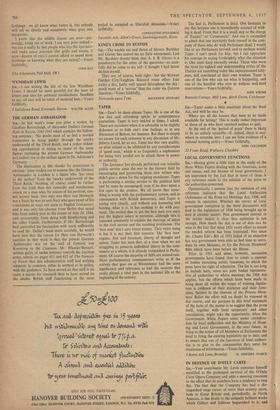THE GERMAN AMBASSADOR SIR,—In last week's issue you print a
review, by Geoffrey Barraclough, of Alexander Dallin's German Rule in Russia, 1941-1945 which contains the follow- ing sentence : 'No doubt most of us feel a morbid fascination in being guided through the murky underworld of the Third Reich, and a rather sicken- ing apprehension at seeing so many of the same figures (including the present German Ambassador in London) rise to the surface again in Dr. Adenauer's Germany. . .
The implication in this slander by association is obvious: your readers are to assume that the German Ambassador in London is a figure who 'has risen to the surface' from the 'murky underworld of the Third Reich.' Nothing, of course, could be farther from the truth than this cowardly and mendacious attack on a man who, by reason of his position, can- not answer back. Not only was Herr von Herwarth not a Nazi: he was an anti-Nazi who gave proof of his convictions in ways not open to English litterateurs; and it was only his absence from Berlin that saved him from taking part in the events of July 20, 1944, and, presumably, from dying with Stauffenberg and his other friends. Furthermore, if Mr. Barraclough had controlled his fascination with murk sufficiently to read Mr. Dallin's book more carefully, he would have seen that the reason for Herr von Herwarth's mention in that work is that the present German Ambassador was on the staff of General von Koestring in the Caucasus. Mr. Wheeler-Bennett, seldom guilty of undue leniency towards the German army, admits. on pages 611 and 612 of The Nemesis of Power that this administrative staff had nothing whatever in common, either in method or in policy, with the gauleiters. To have served on that staff is no more a matter for reproach than to have served on the similar British staff functioning at the same period in occupied or liberated Abyssinia.—Yours faithfully,
CONSTANTINE FITZGIBBON
Sacombs Ash, Allen's Green, Sawbridgeworth, Herts
































 Previous page
Previous page